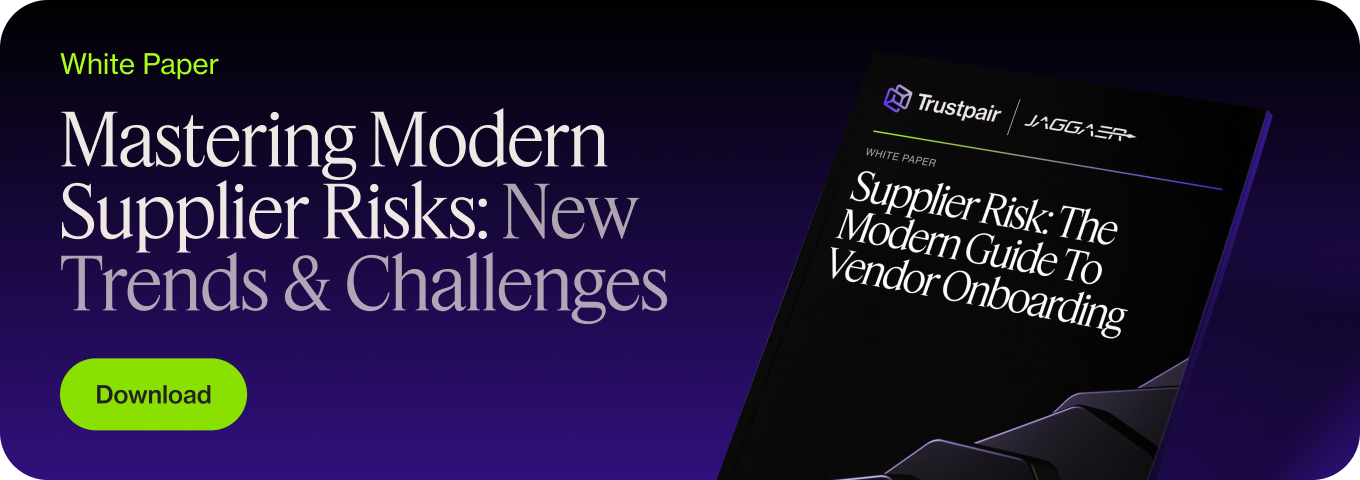mpIn 2023, German carmakers such as Volkswagen, BMW, and Mercedes were accused of using forced labor in their Chinese supply chains. It revealed the need for buyers to ensure due diligence is performed properly in supply chains, as part of compliance standards. Supplier compliance is important for organizations to maintain a good reputation and financial status. Read on and you will find out about some of the other best practices that your business should use…
Trustpair supports this through constant account validation to spot any anomaly or change in status, to ensure compliance with international regulations. Request a demo to learn more!
What is supplier compliance?
Supplier compliance is the process of ensuring that a third-party vendor meets the regulatory and industry requirements of the business it supplies. It also must comply with the business’s internal policies.
Being compliant means suppliers, partners, and service providers meet the same standards as your organization for optimal quality, safety, and industry fairness.
It is best to undertake the compliance process before the procurement of services and products, during the vendor onboarding stage for example.
External compliance
This refers to rules, requirements, and laws set by the government or a governing body. For example, NACHA governs the payment system ACH Network. NACHA’s rules clarify the responsibilities and roles of companies that use the network. This means that all payments on the network are dealt with equally.
External regulations set the industry standards for how organizations can and can’t act, usually through operational means.
An example of this is SOX law. This requires procedures to be implemented for the evaluation and control of data relating to third parties.
Internal compliance
Internal compliance refers to the rules set by the company itself. While breaking these rules doesn’t have the same penalties and risks as external regulations, they are still important (as you will learn in the next section).
It typically relates to employees and may include specific plans that should be followed based on certain events, as formalized in the internal control policies. However, it can also involve suppliers.
For example, British supermarket company Waitrose reintroduced its own form of internal compliance. That referred to charges for suppliers that were breaching delivery standards.
Over the pandemic, Waitrose suspended non-compliance charges. However, from April 2024, the charges are set to return.
Now you know supplier compliance meaning, you need to know why it matters.
Why is supplier compliance important?
Supplier compliance is important so that a business has oversight over its supplier operations. This means that the business can avoid supply chain issues or reputational damages. The impact of that is that the business doesn’t lose out financially because of a third party’s actions. Learn all there is to know about third-party risk assessment here!
So you don’t suffer, it is worth respecting the Know Your Supplier (KYS) principle. It ensures that an organization is aware of the validity of a business before dealing with it and that the partners and vendors are not criminals.
It is a similar concept to Know Your Client or Customer (KYC). However, it focuses on the legitimacy of the supplier as opposed to the identity of a person or customer.
That is because criminals often use companies to disguise their activities in fraud. It helps organizations take a risk-based approach to new and existing customers for security reasons.
All of this contributes to high-quality maintenance and avoids issues.
Deploying supplier compliance best practices like using automation tools to guarantee it is helpful. These tools can flag anomalies or a change in status with suppliers. As a result of that, there is more efficiency in the business.
By using a platform like Trustpair to automate the process, employees can spend their time on other matters of importance.
What are the consequences of non-compliance?
Financial damage
If laws, standards, and regulations aren’t upheld, an organization could be financially penalized.
Moreover, without full oversight of supplier non-compliance, businesses are left vulnerable to fraud. This is because the business could be dealing with another business that is illegitimate and plans to take advantage of having a close relationship with them.
That could allow the fraudsters to complete vendor fraud which can also have financial consequences.
Reputational damage
Word spreads in industries and if a supplier has failed to comply with the standards, it can reflect badly on your business. This could lead to the breakdown of deals and other suppliers, investors and clients may avoid working with you in the future.
Risk of fraud
Lack of compliance and due diligence can mean that businesses fail to spot suspicious behavior. For example, a B2B company could be unaware that their potential supplier has been added to an international blacklist. This is down to poor vetting practices.
Therefore, you wouldn’t know of any wrongdoing by the partner. That puts you at risk of being associated with a supplier who could be money laundering or partaking in fraud. Additionally, the business itself could also be defrauded at some point.
Compliance enforcement is part of a wider supplier risk management strategy, which is imperative in protecting companies against fraud.
Low performance
There could be a drop in performance if there aren’t standards in place that suppliers must adhere to.
What are supplier compliance best practices?
There are several steps to ensure an efficient supplier compliance management system. Having management systems like these in place makes for good processes:
- Due diligence
- Transparent communication
- Compliance training
- Assess supplier compliance
- Automate supplier compliance
Due diligence
Undertaking due diligence for potential suppliers before consolidating a deal can help you avoid suppliers that are non-compliant. This may look like the verification of licenses and checking their history of compliance.
For example, US lawmakers warn that there is an ‘extremely high risk’ that forced Uyghur labor is involved in making products that are sold on Chinese shopping site Temu.
Temu said it wasn’t responsible for sellers using the platform to sell a product.
This shows why buyers need to complete full due diligence on suppliers so they don’t face some of the consequences of non-compliance and can manage risks.
Transparent communication
Ensure there is clear communication between the buyer and the supplier so everyone is on the same page. The supplier compliance requirements must be understood and made official through a contract.
Buyers must ensure suppliers feel comfortable enough that they can raise compliance issues or problems and that they can be dealt with. Refusal of such terms should raise red flags.
Clear-cut communication can also help to align expectations of what is expected of both parties.
Compliance training
By bringing in compliance training for suppliers, you can ensure that the standards have been communicated and that suppliers are empowered to comply.
Additionally, this means that merchants are aware of the latest rules and regulations, limiting the chance of non-compliance.
Assess supplier compliance with audits
Supplier compliance management requires regular audits, with in-depth assessments of both internal and external regulatory compliance.
If suppliers know that they could be appraised at any point, they are more likely to focus on meeting legal standards and improving their own performance.
Partly automate supplier compliance
Integrating with platforms like Trustpair can help you to be compliant with regulations like the Nacha account validation rules and Know Your Supplier (KYS) rules.
The platform constantly monitors supplier data to notice any anomalies or changes in status such as suppliers being placed on international blacklists. Working with Trustpair ensures that your suppliers are compliant with international regulations as you are aware of their data.
For more insights on supplier risks and securing the entire supplier lifecycle, download our white paper on vendor onboarding!
Supplier compliance is essential to maintaining a high-performing business and managing third-party risks. The best practices to master a supplier compliance program involve due diligence, transparent communication, compliance training, assessing supplier compliance, and automating the process with a platform like Trustpair.






